BUS020N582S: Employee Engagement and Solutions for NHS Trust
VerifiedAdded on 2023/04/05
|12
|3140
|90
Report
AI Summary
This report addresses employee engagement challenges within an NHS Trust, proposing solutions to improve employee motivation, communication, and overall organizational performance. It highlights issues such as monotonous job roles, lack of employee involvement, and inadequate safety measures. The report suggests implementing change management processes, fostering employee interaction through brainstorming sessions and reward programs, improving communication channels, and building trust between management and employees. Leadership strategies, including consistent behavior and nonverbal communication, are emphasized to enhance employee engagement and productivity. The report also touches upon the importance of employee feedback and reward systems to create a healthy and competitive work environment, ultimately mitigating the challenges faced by the NHS trust. A personal development plan is also included for self-assessment.
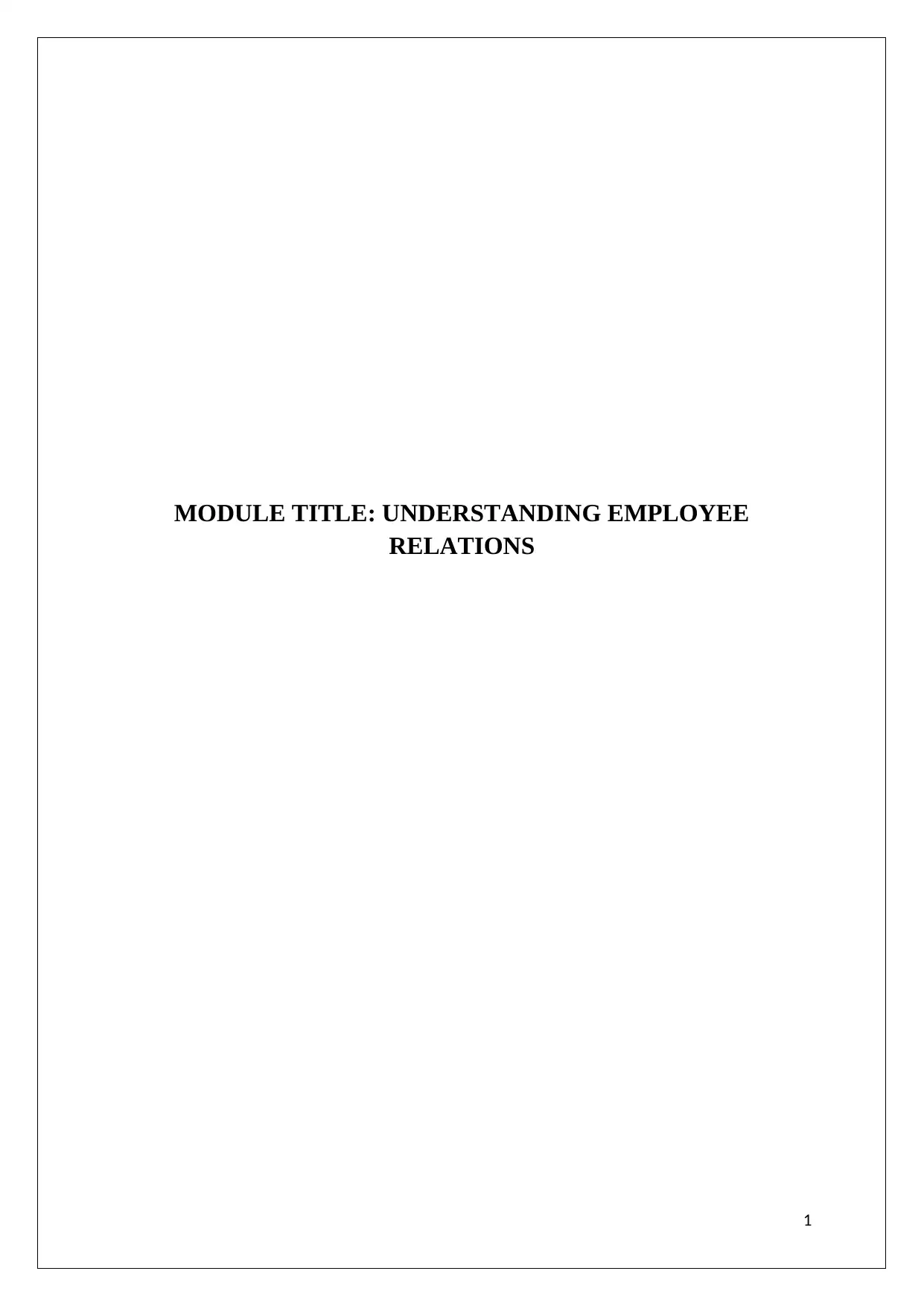
MODULE TITLE: UNDERSTANDING EMPLOYEE
RELATIONS
1
RELATIONS
1
Paraphrase This Document
Need a fresh take? Get an instant paraphrase of this document with our AI Paraphraser
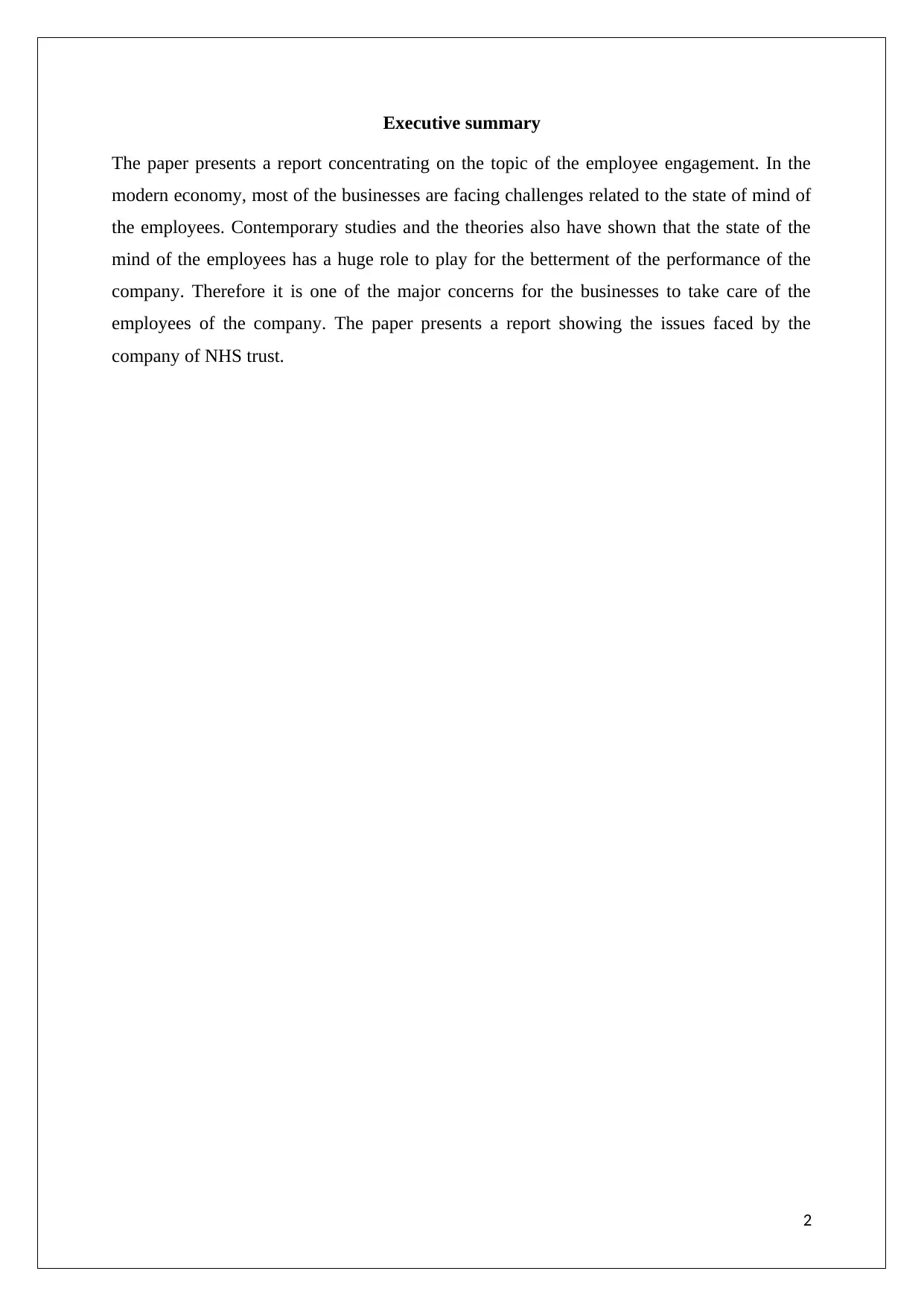
Executive summary
The paper presents a report concentrating on the topic of the employee engagement. In the
modern economy, most of the businesses are facing challenges related to the state of mind of
the employees. Contemporary studies and the theories also have shown that the state of the
mind of the employees has a huge role to play for the betterment of the performance of the
company. Therefore it is one of the major concerns for the businesses to take care of the
employees of the company. The paper presents a report showing the issues faced by the
company of NHS trust.
2
The paper presents a report concentrating on the topic of the employee engagement. In the
modern economy, most of the businesses are facing challenges related to the state of mind of
the employees. Contemporary studies and the theories also have shown that the state of the
mind of the employees has a huge role to play for the betterment of the performance of the
company. Therefore it is one of the major concerns for the businesses to take care of the
employees of the company. The paper presents a report showing the issues faced by the
company of NHS trust.
2
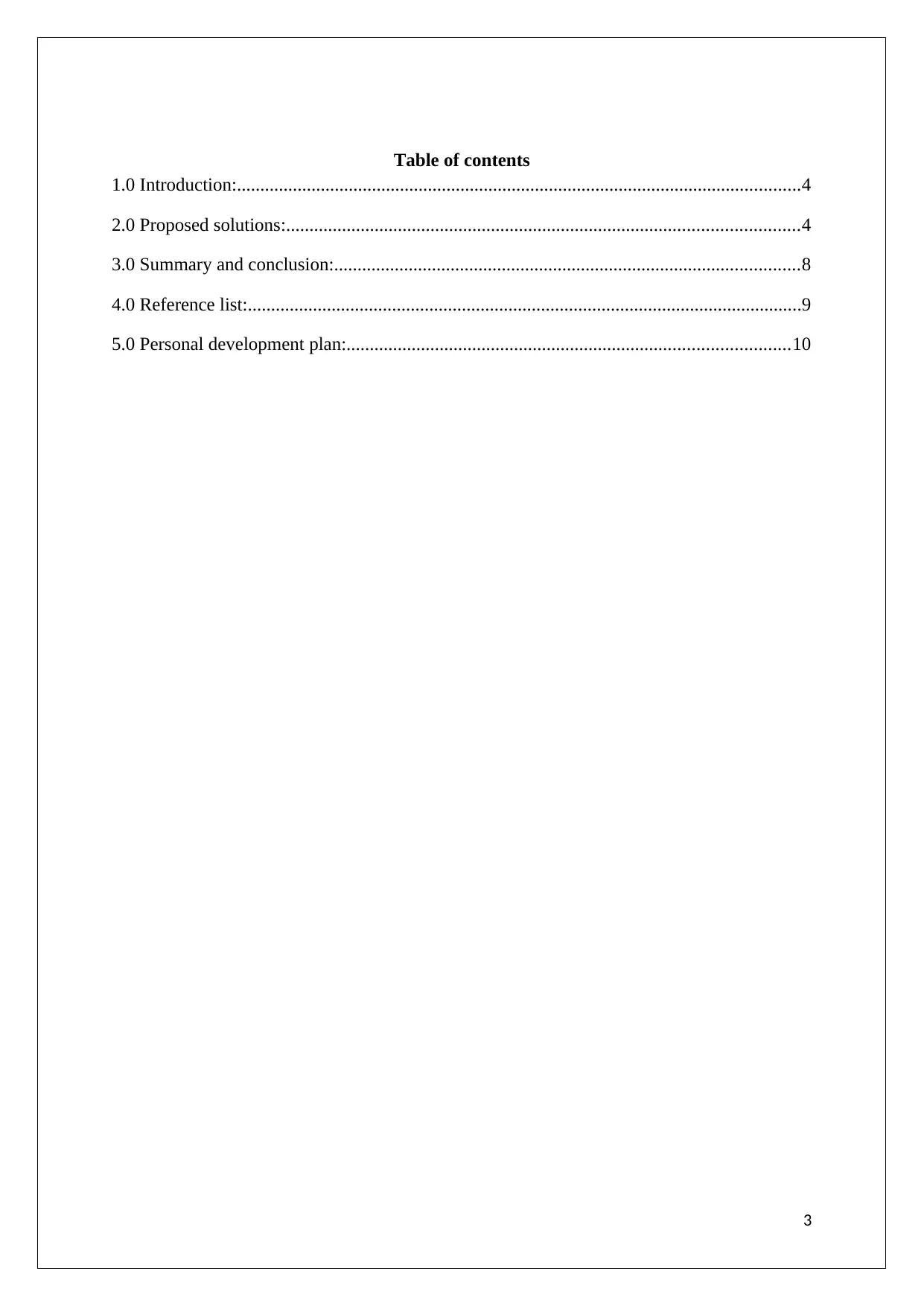
Table of contents
1.0 Introduction:.........................................................................................................................4
2.0 Proposed solutions:..............................................................................................................4
3.0 Summary and conclusion:....................................................................................................8
4.0 Reference list:.......................................................................................................................9
5.0 Personal development plan:...............................................................................................10
3
1.0 Introduction:.........................................................................................................................4
2.0 Proposed solutions:..............................................................................................................4
3.0 Summary and conclusion:....................................................................................................8
4.0 Reference list:.......................................................................................................................9
5.0 Personal development plan:...............................................................................................10
3
⊘ This is a preview!⊘
Do you want full access?
Subscribe today to unlock all pages.

Trusted by 1+ million students worldwide
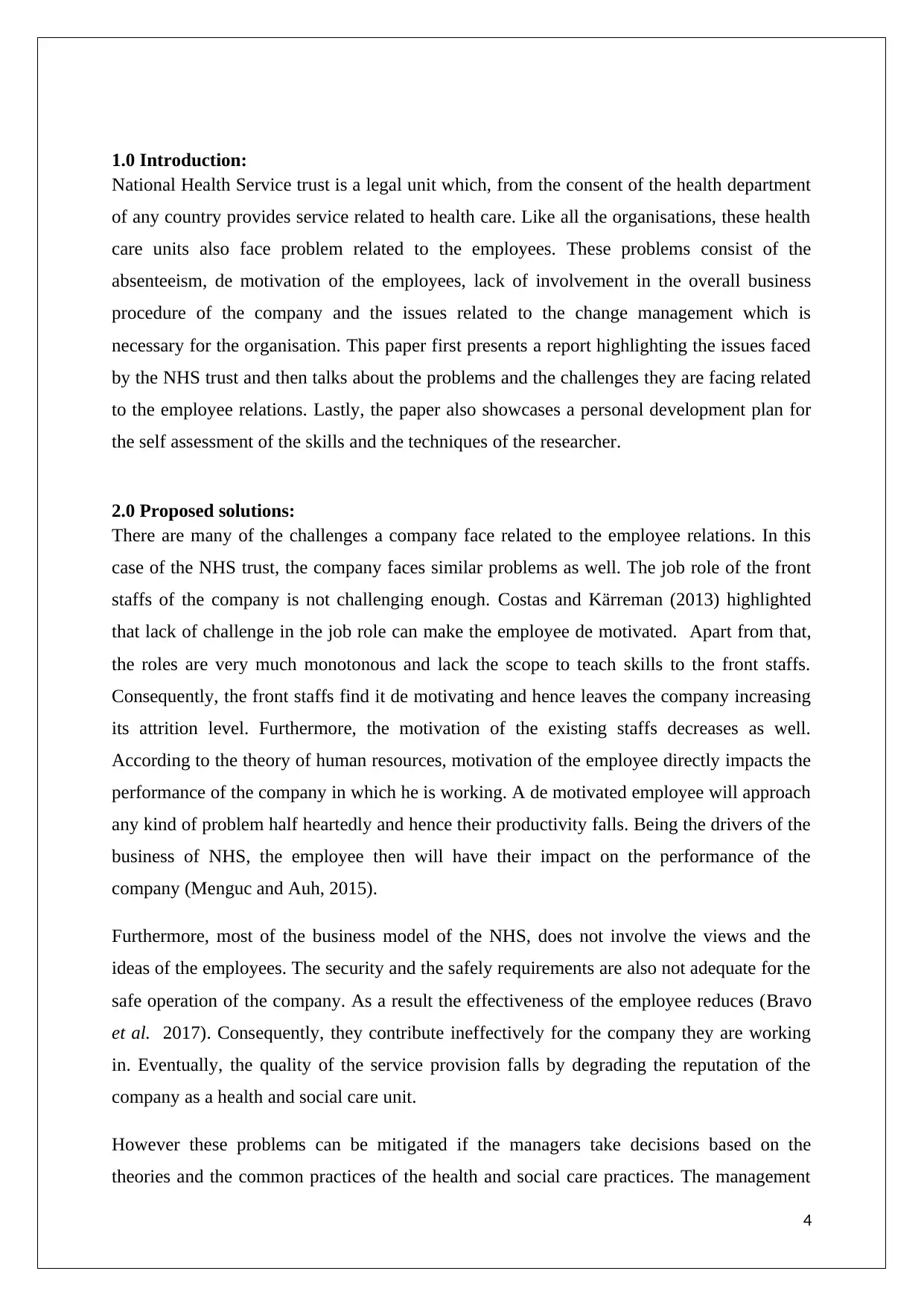
1.0 Introduction:
National Health Service trust is a legal unit which, from the consent of the health department
of any country provides service related to health care. Like all the organisations, these health
care units also face problem related to the employees. These problems consist of the
absenteeism, de motivation of the employees, lack of involvement in the overall business
procedure of the company and the issues related to the change management which is
necessary for the organisation. This paper first presents a report highlighting the issues faced
by the NHS trust and then talks about the problems and the challenges they are facing related
to the employee relations. Lastly, the paper also showcases a personal development plan for
the self assessment of the skills and the techniques of the researcher.
2.0 Proposed solutions:
There are many of the challenges a company face related to the employee relations. In this
case of the NHS trust, the company faces similar problems as well. The job role of the front
staffs of the company is not challenging enough. Costas and Kärreman (2013) highlighted
that lack of challenge in the job role can make the employee de motivated. Apart from that,
the roles are very much monotonous and lack the scope to teach skills to the front staffs.
Consequently, the front staffs find it de motivating and hence leaves the company increasing
its attrition level. Furthermore, the motivation of the existing staffs decreases as well.
According to the theory of human resources, motivation of the employee directly impacts the
performance of the company in which he is working. A de motivated employee will approach
any kind of problem half heartedly and hence their productivity falls. Being the drivers of the
business of NHS, the employee then will have their impact on the performance of the
company (Menguc and Auh, 2015).
Furthermore, most of the business model of the NHS, does not involve the views and the
ideas of the employees. The security and the safely requirements are also not adequate for the
safe operation of the company. As a result the effectiveness of the employee reduces (Bravo
et al. 2017). Consequently, they contribute ineffectively for the company they are working
in. Eventually, the quality of the service provision falls by degrading the reputation of the
company as a health and social care unit.
However these problems can be mitigated if the managers take decisions based on the
theories and the common practices of the health and social care practices. The management
4
National Health Service trust is a legal unit which, from the consent of the health department
of any country provides service related to health care. Like all the organisations, these health
care units also face problem related to the employees. These problems consist of the
absenteeism, de motivation of the employees, lack of involvement in the overall business
procedure of the company and the issues related to the change management which is
necessary for the organisation. This paper first presents a report highlighting the issues faced
by the NHS trust and then talks about the problems and the challenges they are facing related
to the employee relations. Lastly, the paper also showcases a personal development plan for
the self assessment of the skills and the techniques of the researcher.
2.0 Proposed solutions:
There are many of the challenges a company face related to the employee relations. In this
case of the NHS trust, the company faces similar problems as well. The job role of the front
staffs of the company is not challenging enough. Costas and Kärreman (2013) highlighted
that lack of challenge in the job role can make the employee de motivated. Apart from that,
the roles are very much monotonous and lack the scope to teach skills to the front staffs.
Consequently, the front staffs find it de motivating and hence leaves the company increasing
its attrition level. Furthermore, the motivation of the existing staffs decreases as well.
According to the theory of human resources, motivation of the employee directly impacts the
performance of the company in which he is working. A de motivated employee will approach
any kind of problem half heartedly and hence their productivity falls. Being the drivers of the
business of NHS, the employee then will have their impact on the performance of the
company (Menguc and Auh, 2015).
Furthermore, most of the business model of the NHS, does not involve the views and the
ideas of the employees. The security and the safely requirements are also not adequate for the
safe operation of the company. As a result the effectiveness of the employee reduces (Bravo
et al. 2017). Consequently, they contribute ineffectively for the company they are working
in. Eventually, the quality of the service provision falls by degrading the reputation of the
company as a health and social care unit.
However these problems can be mitigated if the managers take decisions based on the
theories and the common practices of the health and social care practices. The management
4
Paraphrase This Document
Need a fresh take? Get an instant paraphrase of this document with our AI Paraphraser
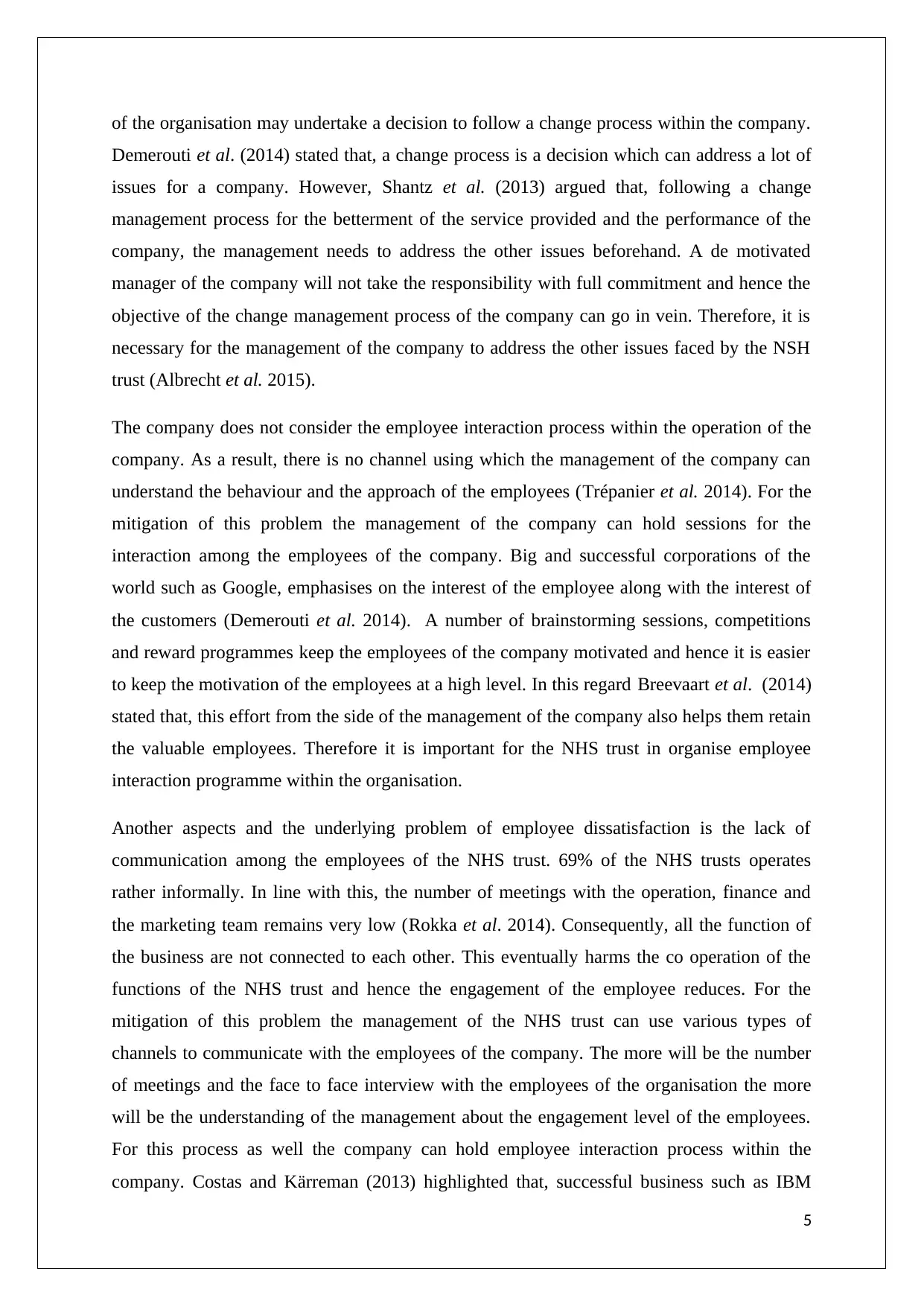
of the organisation may undertake a decision to follow a change process within the company.
Demerouti et al. (2014) stated that, a change process is a decision which can address a lot of
issues for a company. However, Shantz et al. (2013) argued that, following a change
management process for the betterment of the service provided and the performance of the
company, the management needs to address the other issues beforehand. A de motivated
manager of the company will not take the responsibility with full commitment and hence the
objective of the change management process of the company can go in vein. Therefore, it is
necessary for the management of the company to address the other issues faced by the NSH
trust (Albrecht et al. 2015).
The company does not consider the employee interaction process within the operation of the
company. As a result, there is no channel using which the management of the company can
understand the behaviour and the approach of the employees (Trépanier et al. 2014). For the
mitigation of this problem the management of the company can hold sessions for the
interaction among the employees of the company. Big and successful corporations of the
world such as Google, emphasises on the interest of the employee along with the interest of
the customers (Demerouti et al. 2014). A number of brainstorming sessions, competitions
and reward programmes keep the employees of the company motivated and hence it is easier
to keep the motivation of the employees at a high level. In this regard Breevaart et al. (2014)
stated that, this effort from the side of the management of the company also helps them retain
the valuable employees. Therefore it is important for the NHS trust in organise employee
interaction programme within the organisation.
Another aspects and the underlying problem of employee dissatisfaction is the lack of
communication among the employees of the NHS trust. 69% of the NHS trusts operates
rather informally. In line with this, the number of meetings with the operation, finance and
the marketing team remains very low (Rokka et al. 2014). Consequently, all the function of
the business are not connected to each other. This eventually harms the co operation of the
functions of the NHS trust and hence the engagement of the employee reduces. For the
mitigation of this problem the management of the NHS trust can use various types of
channels to communicate with the employees of the company. The more will be the number
of meetings and the face to face interview with the employees of the organisation the more
will be the understanding of the management about the engagement level of the employees.
For this process as well the company can hold employee interaction process within the
company. Costas and Kärreman (2013) highlighted that, successful business such as IBM
5
Demerouti et al. (2014) stated that, a change process is a decision which can address a lot of
issues for a company. However, Shantz et al. (2013) argued that, following a change
management process for the betterment of the service provided and the performance of the
company, the management needs to address the other issues beforehand. A de motivated
manager of the company will not take the responsibility with full commitment and hence the
objective of the change management process of the company can go in vein. Therefore, it is
necessary for the management of the company to address the other issues faced by the NSH
trust (Albrecht et al. 2015).
The company does not consider the employee interaction process within the operation of the
company. As a result, there is no channel using which the management of the company can
understand the behaviour and the approach of the employees (Trépanier et al. 2014). For the
mitigation of this problem the management of the company can hold sessions for the
interaction among the employees of the company. Big and successful corporations of the
world such as Google, emphasises on the interest of the employee along with the interest of
the customers (Demerouti et al. 2014). A number of brainstorming sessions, competitions
and reward programmes keep the employees of the company motivated and hence it is easier
to keep the motivation of the employees at a high level. In this regard Breevaart et al. (2014)
stated that, this effort from the side of the management of the company also helps them retain
the valuable employees. Therefore it is important for the NHS trust in organise employee
interaction programme within the organisation.
Another aspects and the underlying problem of employee dissatisfaction is the lack of
communication among the employees of the NHS trust. 69% of the NHS trusts operates
rather informally. In line with this, the number of meetings with the operation, finance and
the marketing team remains very low (Rokka et al. 2014). Consequently, all the function of
the business are not connected to each other. This eventually harms the co operation of the
functions of the NHS trust and hence the engagement of the employee reduces. For the
mitigation of this problem the management of the NHS trust can use various types of
channels to communicate with the employees of the company. The more will be the number
of meetings and the face to face interview with the employees of the organisation the more
will be the understanding of the management about the engagement level of the employees.
For this process as well the company can hold employee interaction process within the
company. Costas and Kärreman (2013) highlighted that, successful business such as IBM
5
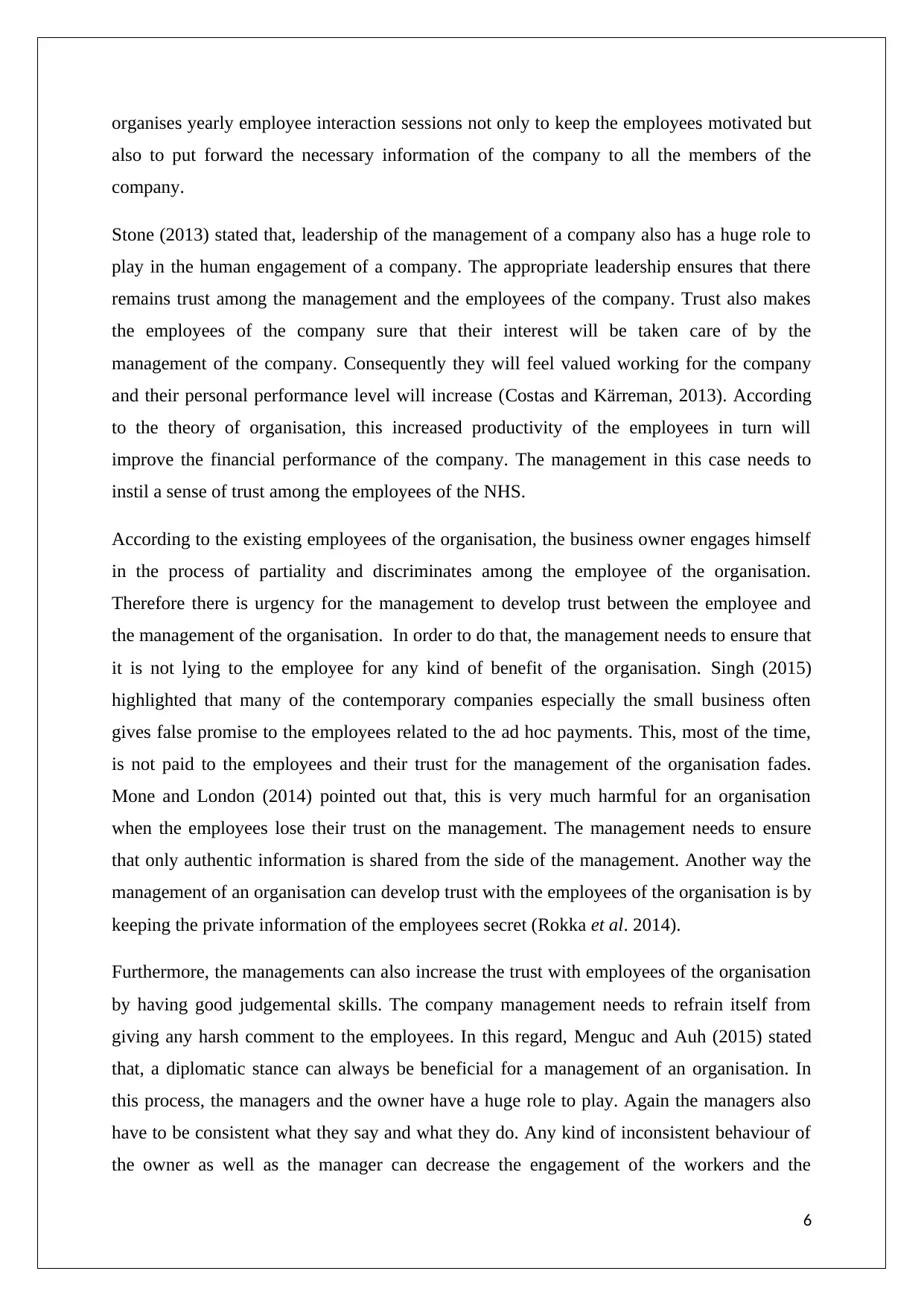
organises yearly employee interaction sessions not only to keep the employees motivated but
also to put forward the necessary information of the company to all the members of the
company.
Stone (2013) stated that, leadership of the management of a company also has a huge role to
play in the human engagement of a company. The appropriate leadership ensures that there
remains trust among the management and the employees of the company. Trust also makes
the employees of the company sure that their interest will be taken care of by the
management of the company. Consequently they will feel valued working for the company
and their personal performance level will increase (Costas and Kärreman, 2013). According
to the theory of organisation, this increased productivity of the employees in turn will
improve the financial performance of the company. The management in this case needs to
instil a sense of trust among the employees of the NHS.
According to the existing employees of the organisation, the business owner engages himself
in the process of partiality and discriminates among the employee of the organisation.
Therefore there is urgency for the management to develop trust between the employee and
the management of the organisation. In order to do that, the management needs to ensure that
it is not lying to the employee for any kind of benefit of the organisation. Singh (2015)
highlighted that many of the contemporary companies especially the small business often
gives false promise to the employees related to the ad hoc payments. This, most of the time,
is not paid to the employees and their trust for the management of the organisation fades.
Mone and London (2014) pointed out that, this is very much harmful for an organisation
when the employees lose their trust on the management. The management needs to ensure
that only authentic information is shared from the side of the management. Another way the
management of an organisation can develop trust with the employees of the organisation is by
keeping the private information of the employees secret (Rokka et al. 2014).
Furthermore, the managements can also increase the trust with employees of the organisation
by having good judgemental skills. The company management needs to refrain itself from
giving any harsh comment to the employees. In this regard, Menguc and Auh (2015) stated
that, a diplomatic stance can always be beneficial for a management of an organisation. In
this process, the managers and the owner have a huge role to play. Again the managers also
have to be consistent what they say and what they do. Any kind of inconsistent behaviour of
the owner as well as the manager can decrease the engagement of the workers and the
6
also to put forward the necessary information of the company to all the members of the
company.
Stone (2013) stated that, leadership of the management of a company also has a huge role to
play in the human engagement of a company. The appropriate leadership ensures that there
remains trust among the management and the employees of the company. Trust also makes
the employees of the company sure that their interest will be taken care of by the
management of the company. Consequently they will feel valued working for the company
and their personal performance level will increase (Costas and Kärreman, 2013). According
to the theory of organisation, this increased productivity of the employees in turn will
improve the financial performance of the company. The management in this case needs to
instil a sense of trust among the employees of the NHS.
According to the existing employees of the organisation, the business owner engages himself
in the process of partiality and discriminates among the employee of the organisation.
Therefore there is urgency for the management to develop trust between the employee and
the management of the organisation. In order to do that, the management needs to ensure that
it is not lying to the employee for any kind of benefit of the organisation. Singh (2015)
highlighted that many of the contemporary companies especially the small business often
gives false promise to the employees related to the ad hoc payments. This, most of the time,
is not paid to the employees and their trust for the management of the organisation fades.
Mone and London (2014) pointed out that, this is very much harmful for an organisation
when the employees lose their trust on the management. The management needs to ensure
that only authentic information is shared from the side of the management. Another way the
management of an organisation can develop trust with the employees of the organisation is by
keeping the private information of the employees secret (Rokka et al. 2014).
Furthermore, the managements can also increase the trust with employees of the organisation
by having good judgemental skills. The company management needs to refrain itself from
giving any harsh comment to the employees. In this regard, Menguc and Auh (2015) stated
that, a diplomatic stance can always be beneficial for a management of an organisation. In
this process, the managers and the owner have a huge role to play. Again the managers also
have to be consistent what they say and what they do. Any kind of inconsistent behaviour of
the owner as well as the manager can decrease the engagement of the workers and the
6
⊘ This is a preview!⊘
Do you want full access?
Subscribe today to unlock all pages.

Trusted by 1+ million students worldwide
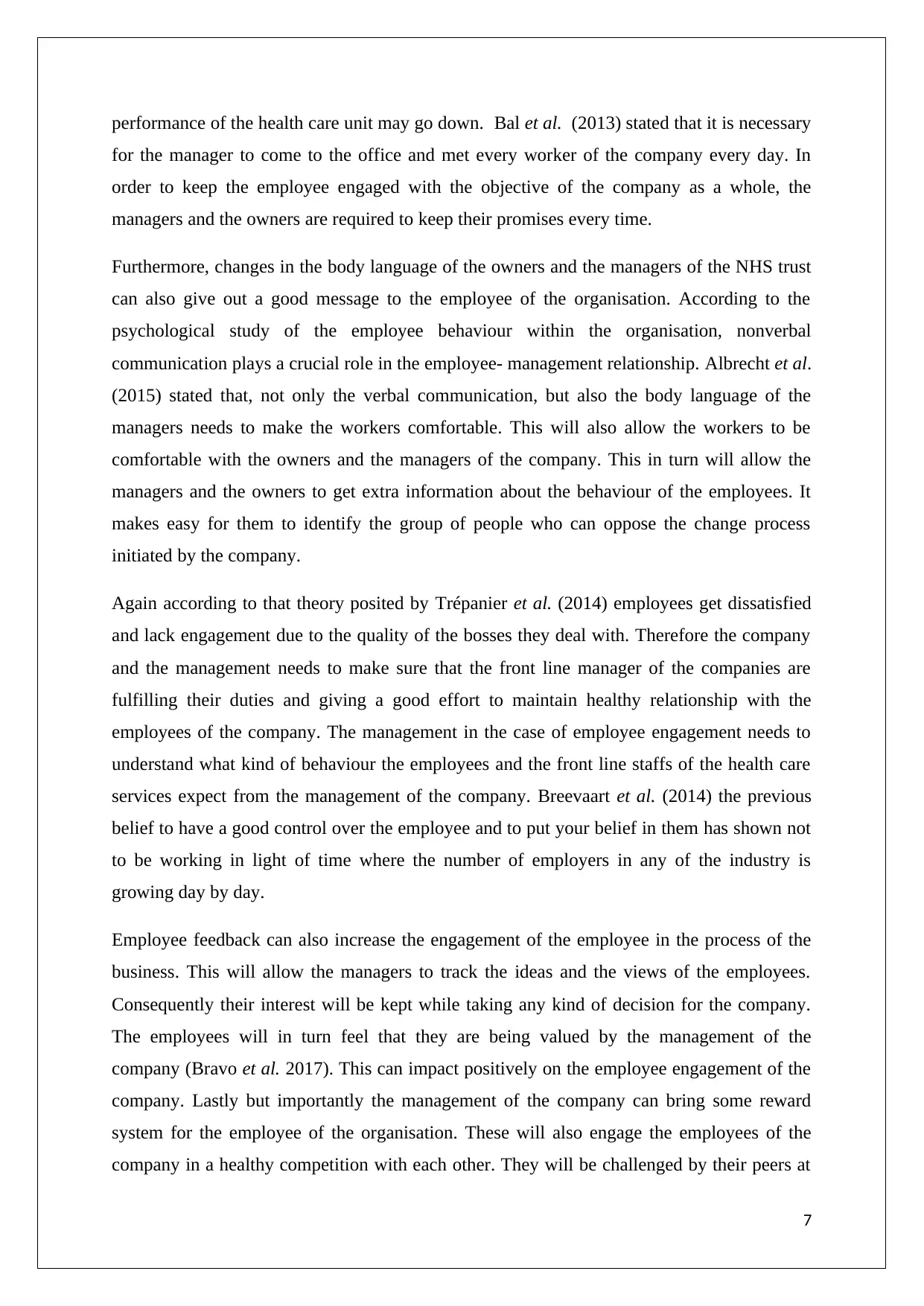
performance of the health care unit may go down. Bal et al. (2013) stated that it is necessary
for the manager to come to the office and met every worker of the company every day. In
order to keep the employee engaged with the objective of the company as a whole, the
managers and the owners are required to keep their promises every time.
Furthermore, changes in the body language of the owners and the managers of the NHS trust
can also give out a good message to the employee of the organisation. According to the
psychological study of the employee behaviour within the organisation, nonverbal
communication plays a crucial role in the employee- management relationship. Albrecht et al.
(2015) stated that, not only the verbal communication, but also the body language of the
managers needs to make the workers comfortable. This will also allow the workers to be
comfortable with the owners and the managers of the company. This in turn will allow the
managers and the owners to get extra information about the behaviour of the employees. It
makes easy for them to identify the group of people who can oppose the change process
initiated by the company.
Again according to that theory posited by Trépanier et al. (2014) employees get dissatisfied
and lack engagement due to the quality of the bosses they deal with. Therefore the company
and the management needs to make sure that the front line manager of the companies are
fulfilling their duties and giving a good effort to maintain healthy relationship with the
employees of the company. The management in the case of employee engagement needs to
understand what kind of behaviour the employees and the front line staffs of the health care
services expect from the management of the company. Breevaart et al. (2014) the previous
belief to have a good control over the employee and to put your belief in them has shown not
to be working in light of time where the number of employers in any of the industry is
growing day by day.
Employee feedback can also increase the engagement of the employee in the process of the
business. This will allow the managers to track the ideas and the views of the employees.
Consequently their interest will be kept while taking any kind of decision for the company.
The employees will in turn feel that they are being valued by the management of the
company (Bravo et al. 2017). This can impact positively on the employee engagement of the
company. Lastly but importantly the management of the company can bring some reward
system for the employee of the organisation. These will also engage the employees of the
company in a healthy competition with each other. They will be challenged by their peers at
7
for the manager to come to the office and met every worker of the company every day. In
order to keep the employee engaged with the objective of the company as a whole, the
managers and the owners are required to keep their promises every time.
Furthermore, changes in the body language of the owners and the managers of the NHS trust
can also give out a good message to the employee of the organisation. According to the
psychological study of the employee behaviour within the organisation, nonverbal
communication plays a crucial role in the employee- management relationship. Albrecht et al.
(2015) stated that, not only the verbal communication, but also the body language of the
managers needs to make the workers comfortable. This will also allow the workers to be
comfortable with the owners and the managers of the company. This in turn will allow the
managers and the owners to get extra information about the behaviour of the employees. It
makes easy for them to identify the group of people who can oppose the change process
initiated by the company.
Again according to that theory posited by Trépanier et al. (2014) employees get dissatisfied
and lack engagement due to the quality of the bosses they deal with. Therefore the company
and the management needs to make sure that the front line manager of the companies are
fulfilling their duties and giving a good effort to maintain healthy relationship with the
employees of the company. The management in the case of employee engagement needs to
understand what kind of behaviour the employees and the front line staffs of the health care
services expect from the management of the company. Breevaart et al. (2014) the previous
belief to have a good control over the employee and to put your belief in them has shown not
to be working in light of time where the number of employers in any of the industry is
growing day by day.
Employee feedback can also increase the engagement of the employee in the process of the
business. This will allow the managers to track the ideas and the views of the employees.
Consequently their interest will be kept while taking any kind of decision for the company.
The employees will in turn feel that they are being valued by the management of the
company (Bravo et al. 2017). This can impact positively on the employee engagement of the
company. Lastly but importantly the management of the company can bring some reward
system for the employee of the organisation. These will also engage the employees of the
company in a healthy competition with each other. They will be challenged by their peers at
7
Paraphrase This Document
Need a fresh take? Get an instant paraphrase of this document with our AI Paraphraser
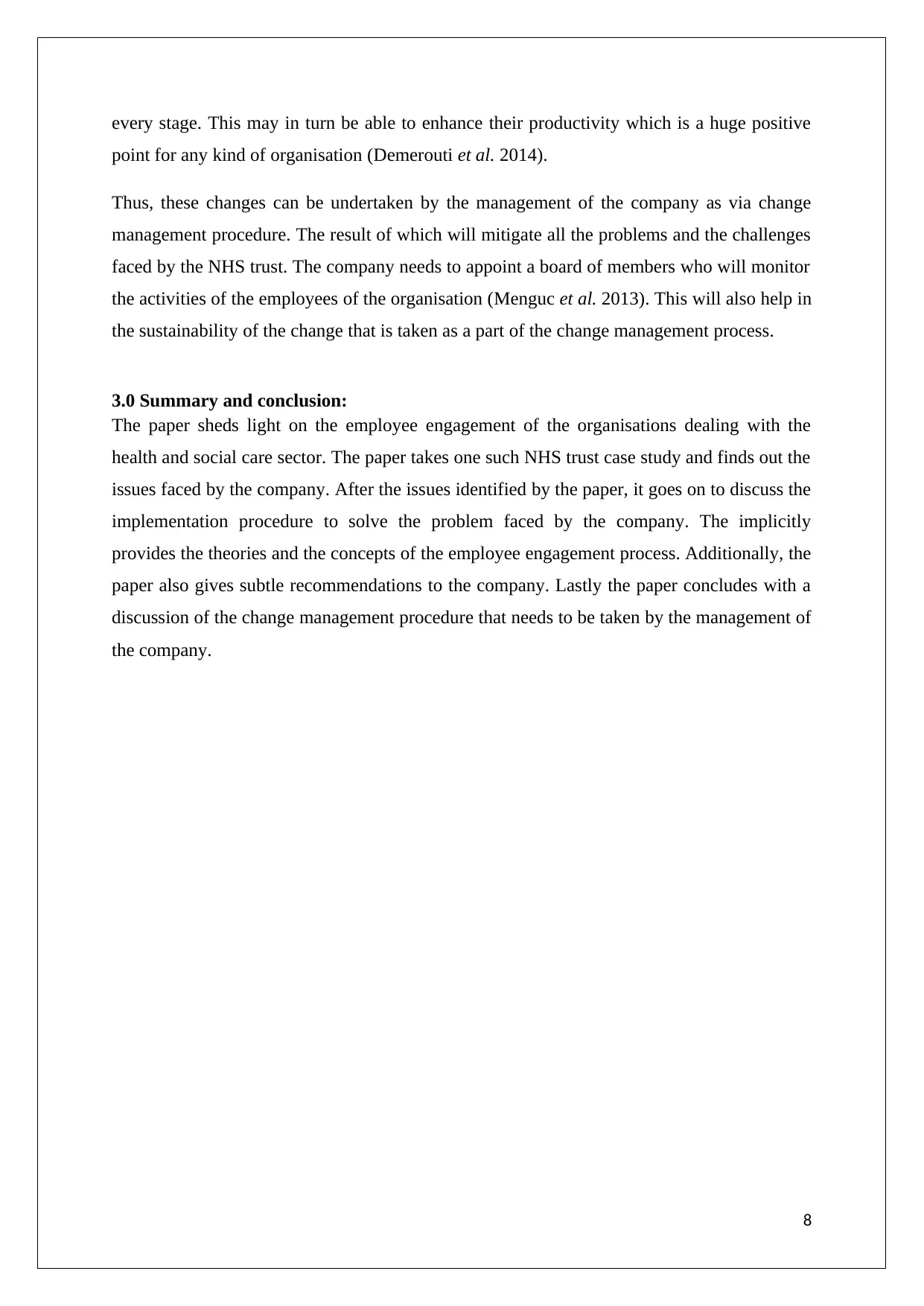
every stage. This may in turn be able to enhance their productivity which is a huge positive
point for any kind of organisation (Demerouti et al. 2014).
Thus, these changes can be undertaken by the management of the company as via change
management procedure. The result of which will mitigate all the problems and the challenges
faced by the NHS trust. The company needs to appoint a board of members who will monitor
the activities of the employees of the organisation (Menguc et al. 2013). This will also help in
the sustainability of the change that is taken as a part of the change management process.
3.0 Summary and conclusion:
The paper sheds light on the employee engagement of the organisations dealing with the
health and social care sector. The paper takes one such NHS trust case study and finds out the
issues faced by the company. After the issues identified by the paper, it goes on to discuss the
implementation procedure to solve the problem faced by the company. The implicitly
provides the theories and the concepts of the employee engagement process. Additionally, the
paper also gives subtle recommendations to the company. Lastly the paper concludes with a
discussion of the change management procedure that needs to be taken by the management of
the company.
8
point for any kind of organisation (Demerouti et al. 2014).
Thus, these changes can be undertaken by the management of the company as via change
management procedure. The result of which will mitigate all the problems and the challenges
faced by the NHS trust. The company needs to appoint a board of members who will monitor
the activities of the employees of the organisation (Menguc et al. 2013). This will also help in
the sustainability of the change that is taken as a part of the change management process.
3.0 Summary and conclusion:
The paper sheds light on the employee engagement of the organisations dealing with the
health and social care sector. The paper takes one such NHS trust case study and finds out the
issues faced by the company. After the issues identified by the paper, it goes on to discuss the
implementation procedure to solve the problem faced by the company. The implicitly
provides the theories and the concepts of the employee engagement process. Additionally, the
paper also gives subtle recommendations to the company. Lastly the paper concludes with a
discussion of the change management procedure that needs to be taken by the management of
the company.
8
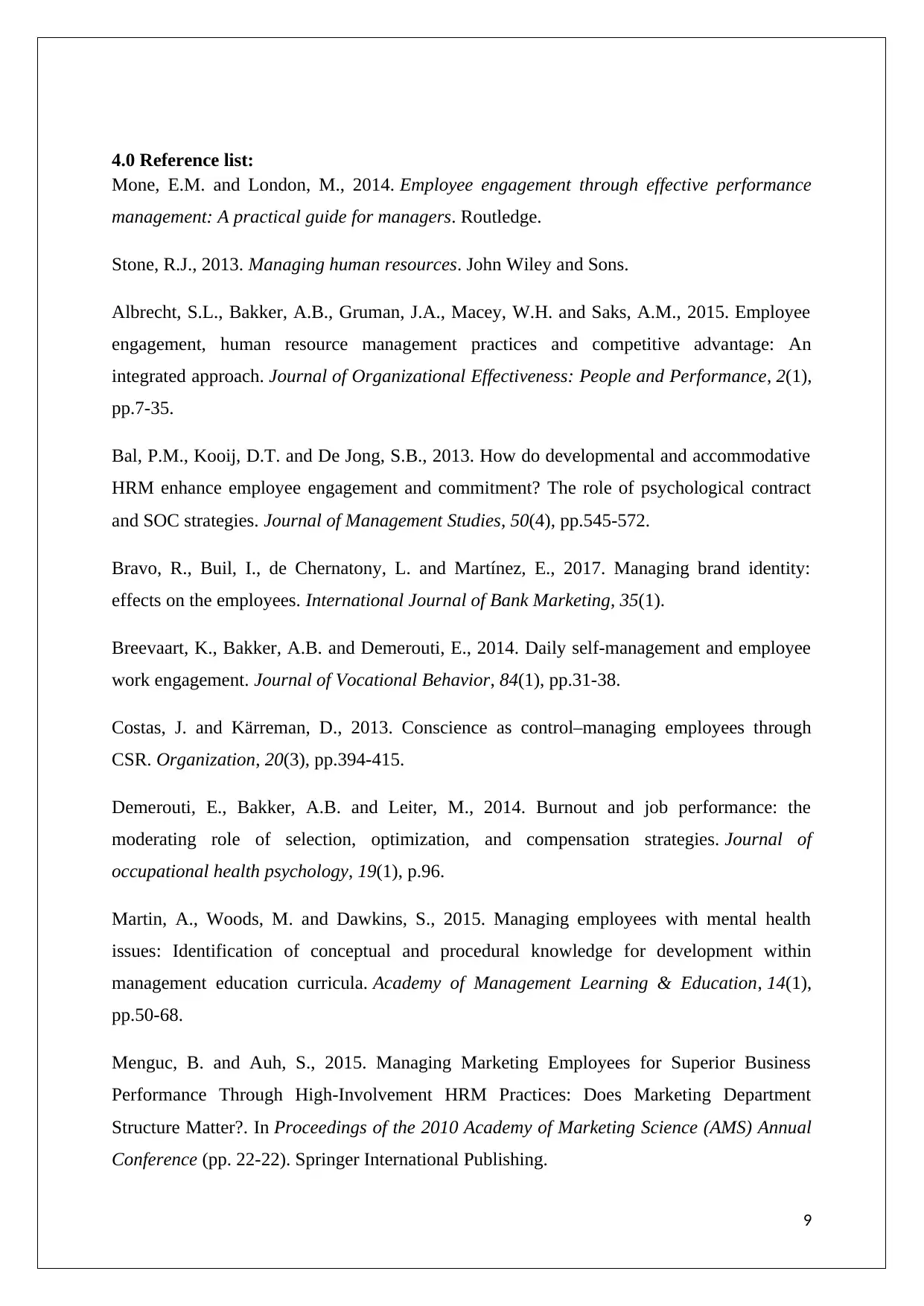
4.0 Reference list:
Mone, E.M. and London, M., 2014. Employee engagement through effective performance
management: A practical guide for managers. Routledge.
Stone, R.J., 2013. Managing human resources. John Wiley and Sons.
Albrecht, S.L., Bakker, A.B., Gruman, J.A., Macey, W.H. and Saks, A.M., 2015. Employee
engagement, human resource management practices and competitive advantage: An
integrated approach. Journal of Organizational Effectiveness: People and Performance, 2(1),
pp.7-35.
Bal, P.M., Kooij, D.T. and De Jong, S.B., 2013. How do developmental and accommodative
HRM enhance employee engagement and commitment? The role of psychological contract
and SOC strategies. Journal of Management Studies, 50(4), pp.545-572.
Bravo, R., Buil, I., de Chernatony, L. and Martínez, E., 2017. Managing brand identity:
effects on the employees. International Journal of Bank Marketing, 35(1).
Breevaart, K., Bakker, A.B. and Demerouti, E., 2014. Daily self-management and employee
work engagement. Journal of Vocational Behavior, 84(1), pp.31-38.
Costas, J. and Kärreman, D., 2013. Conscience as control–managing employees through
CSR. Organization, 20(3), pp.394-415.
Demerouti, E., Bakker, A.B. and Leiter, M., 2014. Burnout and job performance: the
moderating role of selection, optimization, and compensation strategies. Journal of
occupational health psychology, 19(1), p.96.
Martin, A., Woods, M. and Dawkins, S., 2015. Managing employees with mental health
issues: Identification of conceptual and procedural knowledge for development within
management education curricula. Academy of Management Learning & Education, 14(1),
pp.50-68.
Menguc, B. and Auh, S., 2015. Managing Marketing Employees for Superior Business
Performance Through High-Involvement HRM Practices: Does Marketing Department
Structure Matter?. In Proceedings of the 2010 Academy of Marketing Science (AMS) Annual
Conference (pp. 22-22). Springer International Publishing.
9
Mone, E.M. and London, M., 2014. Employee engagement through effective performance
management: A practical guide for managers. Routledge.
Stone, R.J., 2013. Managing human resources. John Wiley and Sons.
Albrecht, S.L., Bakker, A.B., Gruman, J.A., Macey, W.H. and Saks, A.M., 2015. Employee
engagement, human resource management practices and competitive advantage: An
integrated approach. Journal of Organizational Effectiveness: People and Performance, 2(1),
pp.7-35.
Bal, P.M., Kooij, D.T. and De Jong, S.B., 2013. How do developmental and accommodative
HRM enhance employee engagement and commitment? The role of psychological contract
and SOC strategies. Journal of Management Studies, 50(4), pp.545-572.
Bravo, R., Buil, I., de Chernatony, L. and Martínez, E., 2017. Managing brand identity:
effects on the employees. International Journal of Bank Marketing, 35(1).
Breevaart, K., Bakker, A.B. and Demerouti, E., 2014. Daily self-management and employee
work engagement. Journal of Vocational Behavior, 84(1), pp.31-38.
Costas, J. and Kärreman, D., 2013. Conscience as control–managing employees through
CSR. Organization, 20(3), pp.394-415.
Demerouti, E., Bakker, A.B. and Leiter, M., 2014. Burnout and job performance: the
moderating role of selection, optimization, and compensation strategies. Journal of
occupational health psychology, 19(1), p.96.
Martin, A., Woods, M. and Dawkins, S., 2015. Managing employees with mental health
issues: Identification of conceptual and procedural knowledge for development within
management education curricula. Academy of Management Learning & Education, 14(1),
pp.50-68.
Menguc, B. and Auh, S., 2015. Managing Marketing Employees for Superior Business
Performance Through High-Involvement HRM Practices: Does Marketing Department
Structure Matter?. In Proceedings of the 2010 Academy of Marketing Science (AMS) Annual
Conference (pp. 22-22). Springer International Publishing.
9
⊘ This is a preview!⊘
Do you want full access?
Subscribe today to unlock all pages.

Trusted by 1+ million students worldwide
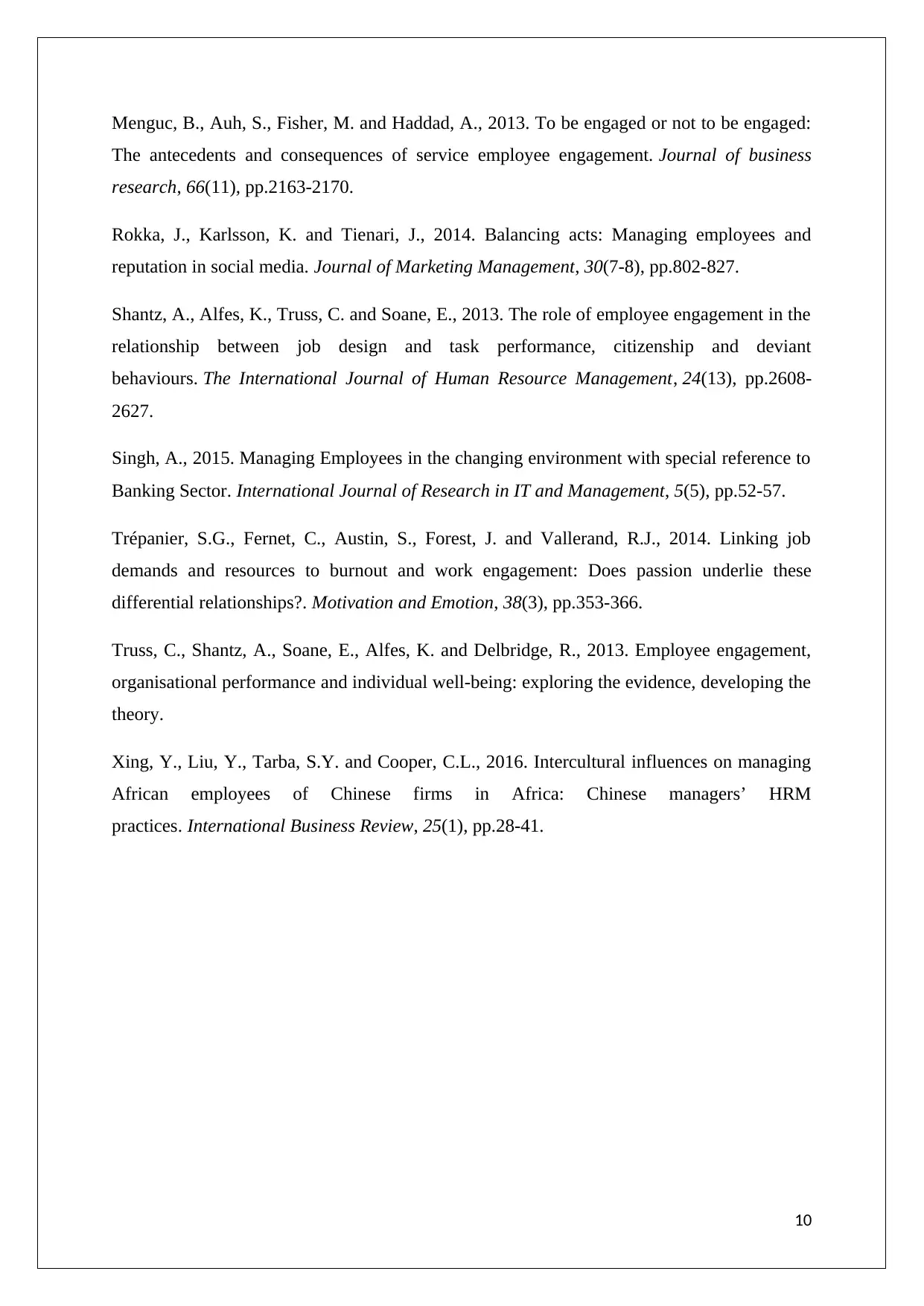
Menguc, B., Auh, S., Fisher, M. and Haddad, A., 2013. To be engaged or not to be engaged:
The antecedents and consequences of service employee engagement. Journal of business
research, 66(11), pp.2163-2170.
Rokka, J., Karlsson, K. and Tienari, J., 2014. Balancing acts: Managing employees and
reputation in social media. Journal of Marketing Management, 30(7-8), pp.802-827.
Shantz, A., Alfes, K., Truss, C. and Soane, E., 2013. The role of employee engagement in the
relationship between job design and task performance, citizenship and deviant
behaviours. The International Journal of Human Resource Management, 24(13), pp.2608-
2627.
Singh, A., 2015. Managing Employees in the changing environment with special reference to
Banking Sector. International Journal of Research in IT and Management, 5(5), pp.52-57.
Trépanier, S.G., Fernet, C., Austin, S., Forest, J. and Vallerand, R.J., 2014. Linking job
demands and resources to burnout and work engagement: Does passion underlie these
differential relationships?. Motivation and Emotion, 38(3), pp.353-366.
Truss, C., Shantz, A., Soane, E., Alfes, K. and Delbridge, R., 2013. Employee engagement,
organisational performance and individual well-being: exploring the evidence, developing the
theory.
Xing, Y., Liu, Y., Tarba, S.Y. and Cooper, C.L., 2016. Intercultural influences on managing
African employees of Chinese firms in Africa: Chinese managers’ HRM
practices. International Business Review, 25(1), pp.28-41.
10
The antecedents and consequences of service employee engagement. Journal of business
research, 66(11), pp.2163-2170.
Rokka, J., Karlsson, K. and Tienari, J., 2014. Balancing acts: Managing employees and
reputation in social media. Journal of Marketing Management, 30(7-8), pp.802-827.
Shantz, A., Alfes, K., Truss, C. and Soane, E., 2013. The role of employee engagement in the
relationship between job design and task performance, citizenship and deviant
behaviours. The International Journal of Human Resource Management, 24(13), pp.2608-
2627.
Singh, A., 2015. Managing Employees in the changing environment with special reference to
Banking Sector. International Journal of Research in IT and Management, 5(5), pp.52-57.
Trépanier, S.G., Fernet, C., Austin, S., Forest, J. and Vallerand, R.J., 2014. Linking job
demands and resources to burnout and work engagement: Does passion underlie these
differential relationships?. Motivation and Emotion, 38(3), pp.353-366.
Truss, C., Shantz, A., Soane, E., Alfes, K. and Delbridge, R., 2013. Employee engagement,
organisational performance and individual well-being: exploring the evidence, developing the
theory.
Xing, Y., Liu, Y., Tarba, S.Y. and Cooper, C.L., 2016. Intercultural influences on managing
African employees of Chinese firms in Africa: Chinese managers’ HRM
practices. International Business Review, 25(1), pp.28-41.
10
Paraphrase This Document
Need a fresh take? Get an instant paraphrase of this document with our AI Paraphraser
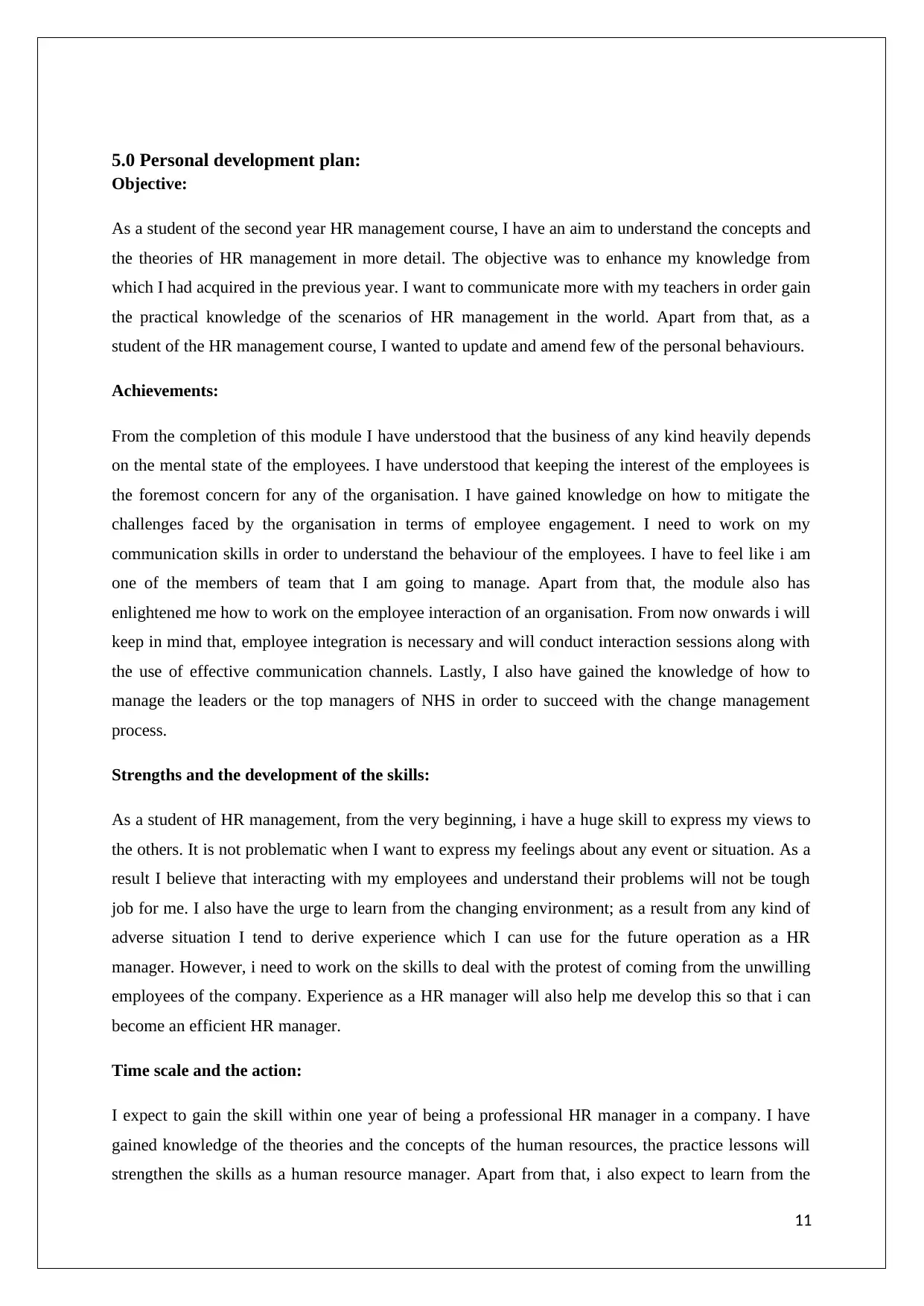
5.0 Personal development plan:
Objective:
As a student of the second year HR management course, I have an aim to understand the concepts and
the theories of HR management in more detail. The objective was to enhance my knowledge from
which I had acquired in the previous year. I want to communicate more with my teachers in order gain
the practical knowledge of the scenarios of HR management in the world. Apart from that, as a
student of the HR management course, I wanted to update and amend few of the personal behaviours.
Achievements:
From the completion of this module I have understood that the business of any kind heavily depends
on the mental state of the employees. I have understood that keeping the interest of the employees is
the foremost concern for any of the organisation. I have gained knowledge on how to mitigate the
challenges faced by the organisation in terms of employee engagement. I need to work on my
communication skills in order to understand the behaviour of the employees. I have to feel like i am
one of the members of team that I am going to manage. Apart from that, the module also has
enlightened me how to work on the employee interaction of an organisation. From now onwards i will
keep in mind that, employee integration is necessary and will conduct interaction sessions along with
the use of effective communication channels. Lastly, I also have gained the knowledge of how to
manage the leaders or the top managers of NHS in order to succeed with the change management
process.
Strengths and the development of the skills:
As a student of HR management, from the very beginning, i have a huge skill to express my views to
the others. It is not problematic when I want to express my feelings about any event or situation. As a
result I believe that interacting with my employees and understand their problems will not be tough
job for me. I also have the urge to learn from the changing environment; as a result from any kind of
adverse situation I tend to derive experience which I can use for the future operation as a HR
manager. However, i need to work on the skills to deal with the protest of coming from the unwilling
employees of the company. Experience as a HR manager will also help me develop this so that i can
become an efficient HR manager.
Time scale and the action:
I expect to gain the skill within one year of being a professional HR manager in a company. I have
gained knowledge of the theories and the concepts of the human resources, the practice lessons will
strengthen the skills as a human resource manager. Apart from that, i also expect to learn from the
11
Objective:
As a student of the second year HR management course, I have an aim to understand the concepts and
the theories of HR management in more detail. The objective was to enhance my knowledge from
which I had acquired in the previous year. I want to communicate more with my teachers in order gain
the practical knowledge of the scenarios of HR management in the world. Apart from that, as a
student of the HR management course, I wanted to update and amend few of the personal behaviours.
Achievements:
From the completion of this module I have understood that the business of any kind heavily depends
on the mental state of the employees. I have understood that keeping the interest of the employees is
the foremost concern for any of the organisation. I have gained knowledge on how to mitigate the
challenges faced by the organisation in terms of employee engagement. I need to work on my
communication skills in order to understand the behaviour of the employees. I have to feel like i am
one of the members of team that I am going to manage. Apart from that, the module also has
enlightened me how to work on the employee interaction of an organisation. From now onwards i will
keep in mind that, employee integration is necessary and will conduct interaction sessions along with
the use of effective communication channels. Lastly, I also have gained the knowledge of how to
manage the leaders or the top managers of NHS in order to succeed with the change management
process.
Strengths and the development of the skills:
As a student of HR management, from the very beginning, i have a huge skill to express my views to
the others. It is not problematic when I want to express my feelings about any event or situation. As a
result I believe that interacting with my employees and understand their problems will not be tough
job for me. I also have the urge to learn from the changing environment; as a result from any kind of
adverse situation I tend to derive experience which I can use for the future operation as a HR
manager. However, i need to work on the skills to deal with the protest of coming from the unwilling
employees of the company. Experience as a HR manager will also help me develop this so that i can
become an efficient HR manager.
Time scale and the action:
I expect to gain the skill within one year of being a professional HR manager in a company. I have
gained knowledge of the theories and the concepts of the human resources, the practice lessons will
strengthen the skills as a human resource manager. Apart from that, i also expect to learn from the
11
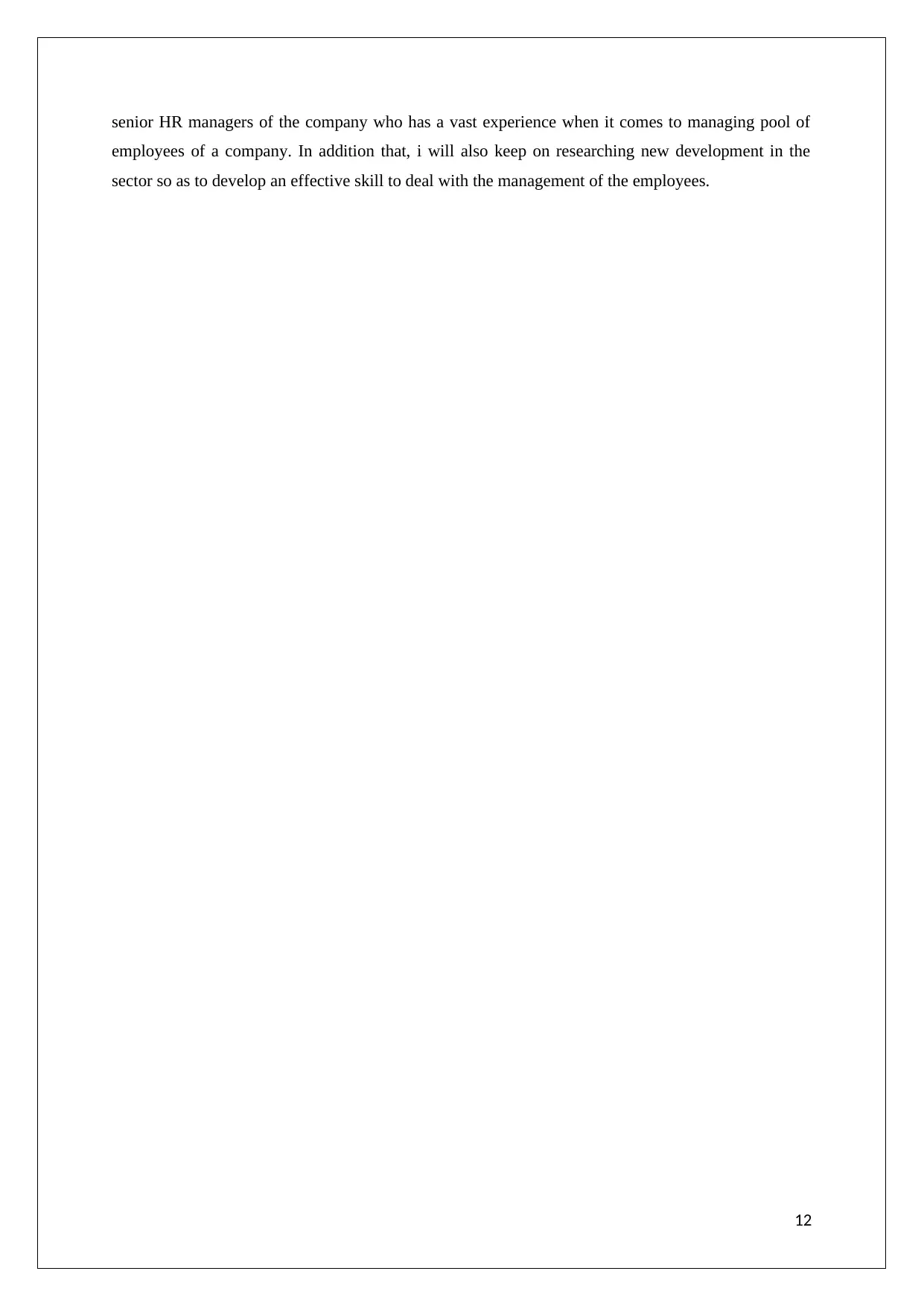
senior HR managers of the company who has a vast experience when it comes to managing pool of
employees of a company. In addition that, i will also keep on researching new development in the
sector so as to develop an effective skill to deal with the management of the employees.
12
employees of a company. In addition that, i will also keep on researching new development in the
sector so as to develop an effective skill to deal with the management of the employees.
12
⊘ This is a preview!⊘
Do you want full access?
Subscribe today to unlock all pages.

Trusted by 1+ million students worldwide
1 out of 12
Related Documents
Your All-in-One AI-Powered Toolkit for Academic Success.
+13062052269
info@desklib.com
Available 24*7 on WhatsApp / Email
![[object Object]](/_next/static/media/star-bottom.7253800d.svg)
Unlock your academic potential
Copyright © 2020–2026 A2Z Services. All Rights Reserved. Developed and managed by ZUCOL.





